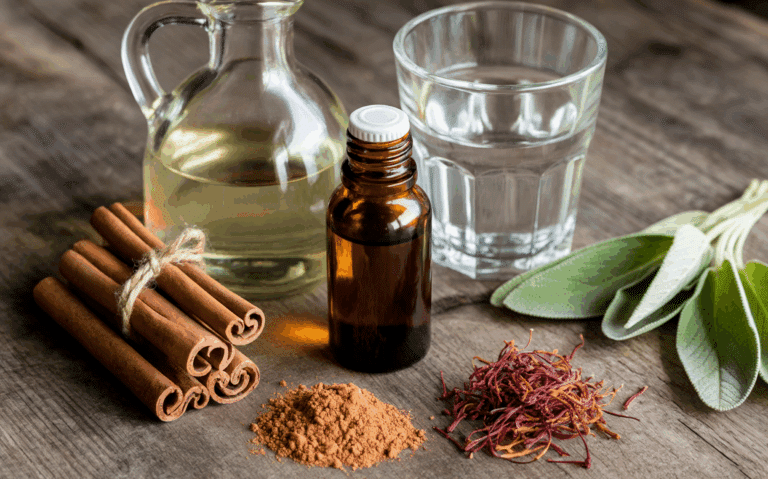10 Effective Natural Remedies for a Bloated Belly

If you’re struggling with bloating, you’re not alone. Many people experience discomfort that can disrupt daily life. Fortunately, you can find relief through natural remedies that don’t require harsh medications. From soothing herbs to simple dietary adjustments, these solutions can help ease your symptoms. Curious about what might work best for you? Let’s explore ten effective natural remedies that could make a difference.
Anise: Nature’s Bloating Remedy
When you’re dealing with a bloated belly, anise might just be the natural remedy you need. This herb has been shown to alleviate various gastrointestinal symptoms, including bloating and abdominal discomfort. Research indicates that anise can specifically help those with IBS and dyspepsia, providing relief from bloating and enhancing your quality of life.
Anise oil, often used in enteric capsules, may further reduce these uncomfortable symptoms. While the exact mechanism isn’t fully understood, studies demonstrate that anise outperforms placebo in reducing bloating. Rich in nutrients, anise can also contribute to your overall health when incorporated into your diet.
Additionally, incorporating anise into an anti-inflammatory diet can further support digestive health. Generally safe, it might cause mild side effects for some. With its traditional use and growing clinical evidence, incorporating anise into your routine could be a beneficial step toward digestive comfort.
The Power of Peppermint
Peppermint’s antispasmodic effects can provide quick relief for your bloated belly.
Peppermint oil helps ease discomfort and reduce gas by relaxing the muscles in your digestive tract. It may also improve digestive function and reduce symptoms of irritable bowel syndrome (IBS). Furthermore, ginger’s ability to promote gastrointestinal motility can complement peppermint’s effects, making it a powerful combination for digestive health.
Incorporating peppermint into your routine might just be the gentle solution you need for digestive woes.
Peppermint’s Antispasmodic Effects
While many remedies exist for alleviating a bloated belly, peppermint stands out for its powerful antispasmodic effects on the gastrointestinal tract.
Peppermint oil works by blocking calcium channels in smooth muscle, reducing contractions that can cause discomfort. The menthol in peppermint directly inhibits the contractility of your colon’s smooth muscle, providing relief from spasms induced by various stimuli. Additionally, peppermint oil is indicated for symptomatic relief of gastrointestinal tract spasms, making it a valuable option for those seeking natural remedies.
Studies show peppermint oil effectively reverses muscle contractions in animal models, demonstrating its potency. In clinical settings, peppermint oil outperforms traditional antispasmodics like Buscopan®, offering greater relief with fewer side effects.
Peppermint Oil Benefits
Building on peppermint’s antispasmodic effects, the benefits of peppermint oil extend far beyond just relief from bloating. Its active constituents, like menthol and menthone, promote muscle relaxation in the gastrointestinal tract, easing discomfort. Peppermint oil can help with conditions like irritable bowel syndrome by calming the digestive system and reducing symptoms such as gas and pain.
Regular use of anti-inflammatory foods can further enhance digestive health and minimize bloating. Enteric-coated formulations guarantee the oil bypasses the upper GI tract, targeting the lower GI for maximum effectiveness.
Additionally, peppermint oil has anti-inflammatory and anti-bacterial properties, further supporting gut health. While generally safe, be mindful that it can relax the lower esophageal sphincter, which might lead to reflux in some individuals. Evidence suggests enteric-coated peppermint oil’s soothing benefits for your digestive wellness!
Chamomile: A Calming Digestive Aid
If you’re looking for a natural way to soothe your digestive troubles, chamomile might be just what you need. This gentle herb acts as a muscle relaxant, alleviating cramps and indigestion while promoting gut health. Additionally, chamomile has been used historically for various conditions such as stomach issues and anxiety relief. It can be particularly effective for managing symptoms of upset stomach caused by stress or anxiety.
Here are three key benefits of chamomile for your digestion:
- Anti-Spasmodic Properties: Chamomile relaxes stomach and intestinal muscles, easing discomfort from cramps and bloating.
- Anti-Inflammatory Effects: Its extracts inhibit inflammatory mediators, helping to reduce symptoms of irritable bowel syndrome (IBS) and digestive disorders.
- Antimicrobial Action: Chamomile’s antimicrobial properties support a balanced gut microbiome, which is essential for preventing infections that lead to bloating.
Incorporating chamomile into your routine can considerably enhance your digestive comfort and overall well-being.
Caraway Seeds for Gas Relief
Caraway seeds are a powerful ally when it comes to relieving gas and bloating, making them a go-to remedy for digestive discomfort. Their carminative properties help facilitate gas expulsion, while their antispasmodic effects can ease stomach and intestinal spasms. You might find that incorporating caraway seeds into your diet not only alleviates gas but can also stimulate your appetite.
Traditionally, they’ve been used to treat indigestion and are known for their galactagogue properties, aiding in milk production for nursing mothers. Additionally, caraway exhibits antimicrobial activity against foodborne pathogens, providing an extra layer of digestive support. With essential oils and flavonoids packed into these tiny seeds, you’re tapping into a rich source of natural relief. Just remember to consult a healthcare provider if you have any concerns or underlying conditions.
Coriander: A Digestive Ally
Coriander isn’t just a flavorful spice; it’s a powerful ally for your digestive health. Its antispasmodic properties can help relieve gas and bloating, while also boosting bile secretion to enhance digestion. Additionally, coriander contains vitamin C and essential oils that may further support digestive health by aiding in the modulation of gut function and promoting overall well-being. Let’s explore how you can incorporate this versatile herb into your routine for better gut health.
Digestive Benefits of Coriander
While you may not think of spices as powerful allies for digestion, coriander has long been celebrated for its remarkable digestive benefits. This versatile herb not only adds flavor to your meals but also helps alleviate digestive discomfort.
Here are three key benefits of coriander for digestion:
- Antispasmodic Effects: Coriander relaxes digestive muscles, reducing discomfort associated with irritable bowel syndrome (IBS).
- Gastrointestinal Health: It aids in digestion and relieves symptoms of indigestion, making it a traditional remedy for gastrointestinal issues. Additionally, coriander is known for its antioxidant properties, which may further support digestive health.
- Antibacterial Properties: Coriander contains compounds that combat harmful bacteria, helping maintain a healthy gut environment.
Incorporating coriander into your diet can support overall digestive health and enhance your wellbeing.
How to Use Coriander
When you’re looking for natural remedies to alleviate bloating, incorporating coriander into your routine can be highly effective.
Start by brewing coriander seed tea; steeping the seeds in hot water creates a soothing drink that aids digestion. You can also soak coriander seeds overnight in water and sip it the next day to help reduce bloating.
Adding coriander seeds to your meals enhances their digestive benefits, making cooking with coriander a smart choice. For additional relief, consider combining coriander with herbs like fennel or cumin.
Just remember to start with small amounts to see how your body reacts, especially if you have chronic health conditions or are pregnant. Always consult a healthcare professional if you’re unsure. Understanding gut health is crucial as it communicates a distinct language impacting overall health.
Coriander in Traditional Medicine
Incorporating coriander into your diet not only aids digestion but also connects you to its rich history in traditional medicine. This aromatic herb has long been recognized for its beneficial properties, especially in digestive health. Here are three key benefits of coriander:
- Digestive Aid: Coriander stimulates digestive enzymes, reducing symptoms of bloating and indigestion.
- Carminative Properties: It helps expel gas from your digestive tract, alleviating discomfort.
- Antibacterial Action: Coriander supports a balanced gut microbiome, promoting overall digestive wellness. Additionally, it contains compounds that may fight infections, which further enhances its role in maintaining gut health.
Essential Oils for Bloating Relief
Essential oils offer a natural approach to relieving bloating, and several options can help ease discomfort effectively.
Peppermint oil is a standout choice, relaxing digestive muscles and reducing colonic spasms. M. spicata essential oil also shines for its anti-bloating effects, particularly in treating indigestion-related issues.
Anise oil has shown promise in clinical trials for alleviating bloating and gastrointestinal discomfort. Limited independent studies support the effectiveness of these oils, emphasizing the need for careful consideration of their use.
While lavender and tea tree oils have their benefits, they aren’t specifically known for bloating relief.
Remember to use these oils with caution; consult a healthcare professional before starting any new remedy, especially if you have GERD or other sensitivities.
Proper dosage and application methods are vital for maximizing benefits and minimizing potential side effects.
Dietary Adjustments to Consider
To effectively manage bloating, consider making some simple yet impactful dietary adjustments. These changes can help ease discomfort and improve digestion.
- Eat Smaller Meals: Divide your meals into smaller portions to avoid overwhelming your digestive system.
- Limit Carbonated Drinks: Avoid sodas and beer, which introduce carbon dioxide and contribute to bloating.
- Chew Food Thoroughly: Properly chewing your food reduces the amount of air you swallow, helping to prevent bloating. Swallowed air can result from behaviors like gulping foods, so being mindful while eating is essential.
Additionally, drink beverages at room temperature and avoid using straws to minimize air intake.
Incorporating these adjustments into your daily routine can greatly reduce bloating and promote a more comfortable digestive experience.
Herbal Teas to Soothe Your Stomach
If you’re looking for a natural way to ease bloating, herbal teas can be a soothing solution.
Peppermint tea is great for relaxing your gut and relieving spasms, while ginger tea helps stimulate digestion. Peppermint’s ability to inhibit immune cell activity in the gut may further contribute to reducing bloating. Chamomile tea offers anti-inflammatory benefits, promoting overall digestive health. You might also find lemon balm tea calming, as it soothes both your mind and stomach.
Fennel tea can help reduce gas and bloating due to its active compounds.
To get the most out of these teas, drink peppermint or ginger tea before meals. Chamomile and lemon balm can be enjoyed any time, while fennel should be consumed in moderation.
Each of these teas brings unique benefits, so experiment to see what works best for you.
Supplements and Medications for Relief
When you’re dealing with a bloated belly, certain supplements and medications can offer quick relief. Simethicone helps break down gas bubbles, while probiotics support your gut health for lasting benefits. Additionally, alpha-D-galactosidase can reduce gas from complex carbohydrates, making your meals more enjoyable. Understanding the causes of bloating is essential for effective treatment, as it can help tailor your approach to managing symptoms.
Simethicone for Gas Relief
Simethicone, a widely used over-the-counter remedy, effectively alleviates gas-related discomfort, including bloating and pressure in the gastrointestinal tract. This medication functions as a surfactant to decrease surface tension of gas bubbles, facilitating easier expulsion of gas from the body. It’s available in various forms, making it easy for you to find the right option:
- Forms: Choose from tablets, capsules, chewable films, or liquid formulations.
- Dosage: Adults typically take 40 to 125 mg four times daily, while children can take 40 mg.
- Combination Products: Simethicone is often found alongside other medications like aluminum hydroxide or magnesium hydroxide for enhanced relief.
Probiotics for Gut Health
While simethicone effectively alleviates gas-related discomfort, probiotics offer another avenue for managing bloating and enhancing gut health.
Specific probiotic strains have shown moderate to strong evidence in reducing bloating, especially in IBS patients. Clinical trials indicate that probiotics markedly improve global IBS symptoms, with a relative risk of relief between 2.1 and 2.4 compared to placebo.
They work by modulating gut microbiota, enhancing intestinal transit, and reducing inflammation, all of which can alleviate bloating. However, the effectiveness varies by strain and individual factors, so choosing the right probiotic is essential.
Alpha-D-Galactosidase Benefits
Alpha-D-Galactosidase offers a promising solution for those struggling with gas and bloating. This digestive enzyme breaks down complex carbohydrates, specifically targeting those in beans and similar foods that often lead to discomfort.
Here are three key benefits you can expect:
- Reduced Gas Production: By breaking down fermentable carbohydrates, it minimizes the amount of undigested material that ferments in your colon, considerably lowering gas symptoms.
- Efficacy in Clinical Studies: Randomized trials show that it effectively reduces symptoms like bloating and flatulence, especially in individuals prone to gas-related issues.
- Safe for Most Users: Generally considered safe, it has minimal side effects, though you should consult your doctor before starting, especially if you’re pregnant or have underlying health concerns.
Lifestyle Changes to Combat Bloating
Lifestyle changes can greatly reduce bloating and improve your overall digestive health. Start by incorporating regular exercise, focusing on core-strengthening activities to enhance gut motility.
Shift to a high-fiber diet gradually; it may cause temporary bloating but benefits your digestion in the long run. Stay hydrated by drinking plenty of water, which eases digestion.
Opt for smaller, more frequent meals to help your digestive system work efficiently. Minimize processed foods and choose low-fructose fruits like bananas and oranges.
Avoid carbonated beverages to prevent excess air in your digestive tract. Finally, consider sipping on herbal teas like peppermint or ginger after meals for added digestive support.
These simple adjustments can greatly alleviate bloating over time.
Frequently Asked Questions
Can Bloating Be a Sign of a Serious Health Issue?
Yes, bloating can indicate serious health issues. If you experience persistent or severe bloating, it’s essential to consult a healthcare professional to rule out conditions like gastrointestinal malignancies or other underlying disorders that might require attention.
How Long Does It Typically Take for Remedies to Work?
Typically, remedies can start working within minutes to hours. For immediate relief, you might find solutions like peppermint tea or abdominal massages effective, while dietary changes may take a few days for noticeable effects.
Are There Any Side Effects From Using These Natural Remedies?
Yes, there can be side effects from natural remedies. You might experience heartburn with peppermint oil, allergic reactions from chamomile tea, or stomach upset from turmeric, so it’s important to use these remedies cautiously.
Can Stress Alone Cause Bloating?
Yes, stress alone can cause bloating. It disrupts your gut microbiome, increases inflammation, and alters digestion. When you’re stressed, you may notice more discomfort and sensitivity in your gastrointestinal tract, leading to bloating.
Is Bloating More Common in Certain Age Groups?
Yes, bloating is more common in younger adults, particularly those under 40. As you age, the prevalence decreases, with women reporting higher rates than men across various age groups. Bloating can still affect older individuals, though.
Conclusion
Incorporating these natural remedies into your routine can help you find relief from bloating. Whether you choose to sip on chamomile tea, chew on caraway seeds, or make simple dietary adjustments, there’s a solution that can work for you. Remember to listen to your body and consult a healthcare professional before trying new approaches. With the right strategies, you can tackle bloating and enjoy a more comfortable digestive experience.
References
- https://www.health.harvard.edu/staying-healthy/how-to-get-rid-of-bloating-tips-for-relief
- https://www.brighamandwomens.org/patients-and-families/meals-and-nutrition/bwh-nutrition-and-wellness-hub/special-topics/gas-beat-the-bloat
- https://pmc.ncbi.nlm.nih.gov/articles/PMC3264926/
- https://pmc.ncbi.nlm.nih.gov/articles/PMC4991532/
- https://naturemed.org/the-best-natural-remedies-for-bloating/
- https://pmc.ncbi.nlm.nih.gov/articles/PMC10824915/
- https://pmc.ncbi.nlm.nih.gov/articles/PMC4354059/
- https://www.healthline.com/nutrition/anise
- https://journals.lww.com/nutritiontodayonline/fulltext/2022/03000/anise__potential_health_benefits.10.aspx
- https://pmc.ncbi.nlm.nih.gov/articles/PMC5814329/






